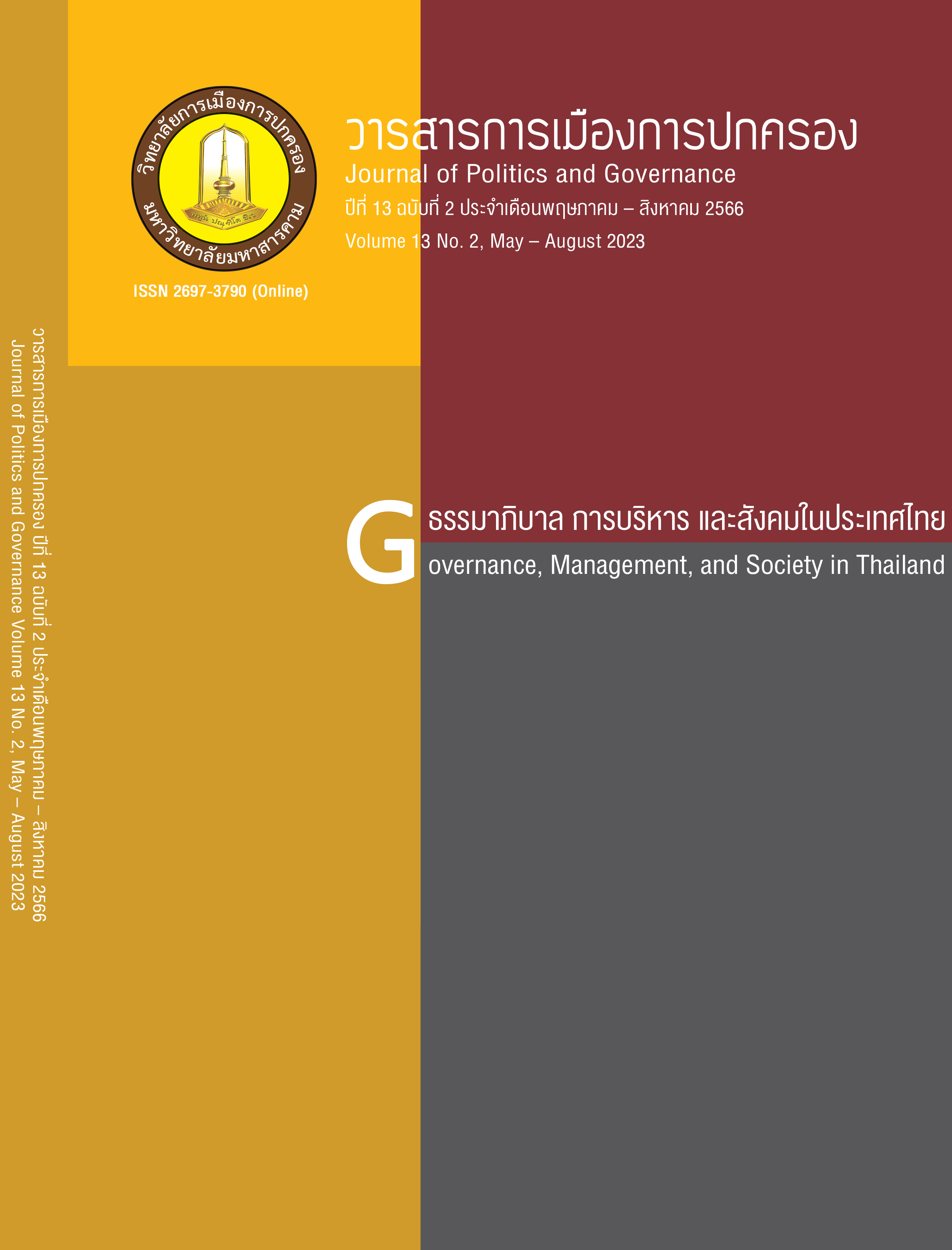Situation and Management of Social Enterprise Through Community Interest Company on Participation of Community Approach International and Context of Thailand
Main Article Content
Abstract
The objectives of the article were to 1) study the Social Enterprise situation in foreign countries and Thailand context; and 2) study the concept of operating social enterprises, businesses that were interested in community participation according to the concept of corporate social responsibility, social enterprise, community involvement, and the theory of community empowerment. This research was quantitative by reviewing literature from papers, theses, and academic books in Thai and foreign languages. Semi-structured in-depth interviews were collected. The key informants were non-profit organizations, corporate social responsibility businesses, and community enterprises, comprising 17 people. Using content analysis, the results showed that:
1. Overseas, the situation of social enterprises in line with sustainable development approaches creates job creation and generates income along with social and economic growth and environmental development. They are returning benefits to communities and organizations as recipients of social enterprise services. Thailand established a limited company to help with tax measures. Significant differences exist between business models where partners or shareholders share profits.
2. Social enterprises, a business operating model that benefits from linking operations through synergies, community empowerment, and development partner agencies, provide role-based support to help from community participation to create continuity and sustainability.
Article Details

This work is licensed under a Creative Commons Attribution-NonCommercial-NoDerivatives 4.0 International License.
References
กรมการพัฒนาชุมชน. (2562). ผลงานเด่นและวิธีปฏิบัติที่ดี Best Practice การขับเคลื่อนงานเศรษฐกิจฐานรากและประชารัฐ 76 จังหวัด. กรุงเทพฯ: องค์กรออนอาร์ตครีเอชั่น จำกัด.
จีระ พุ่มพวง, และกำชัย จงจักรพันธ์. (2565). มาตรการส่งเสริมวิสาหกิจเพื่อสังคมตามพระราชบัญญัติส่งเสริมวิสาหกิจเพื่อสังคม พ.ศ. 2562. วารสารรัชต์ภาคย์, 16(46), 262-278.
ชนัฐนันท์ ม่วงวิเชียร. (2561). กิจการเพื่อสังคมกับบทบาทภาคส่วนที่สามเพื่อการพัฒนาสังคม อย่างยั่งยืน กรณีคุณมีชัย วีระไวทยะ(ดุษฎีนิพนธ์ปรัชญาดุษฎีบัณฑิต). มหาวิทยาลัยรังสิต.
ณัฐวีณ์ บุนนาค. (2565). สถาบันอุดมศึกษากับการส่งเสริมความสมบูรณ์ของระบบนิเวศทางธุรกิจของวิสาหกิจเพื่อสังคมในประเทศไทย. วารสารการเมืองการปกครอง, 12(2), 125-145.
ตลาดหลักทรัพย์แห่งประเทศไทย. (2560). รายงานประจำปี 2560. กรุงเทพฯ: สำนักพิมพ์ตลาดหลักทรัพย์แห่งประเทศไทย.
ติญทรรศน์ ประทีปพรณรงค์. (2563). การพัฒนาอย่างยั่งยืนกับวิสาหกิจเพื่อสังคม. นนทบุรี: โรงพิมพ์รัตนไตร.
ประทีป อึ้งทรงธรรม ฮาตะ. (2562). เลขาธิการมูลนิธิดวงประทีป. สัมภาษณ์, 31 สิงหาคม.
พระราชบัญญัติส่งเสริมวิสาหกิจเพื่อสังคม. (2562). ราชกิจจานุเบกษา. เล่มที่ 136 ตอนที่ 67, หน้า 32-56 (22 พฤษภาคม 2562).
มณีรัตน์ จันทร์หนิ้ว, ประพิน นุชเปี่ยม, และวริยา ล้ำเลิศ. (2565). การพัฒนากรอบแนวคิดทางกฎหมายเพื่อส่งเสริมวิสาหกิจเพื่อสังคมในประเทศไทย. วารสารรัชต์ภาคย์, 16(48), 46-60.
มีชัย วีระไวทยะ. (2562). สมาคมพัฒนาประชากรและชุมชน. สัมภาษณ์, 3 กันยายน.
รัตพงษ์ สอนสุภาพ, และบุญสม เกษะประดิษฐ์. (2561). ความมั่นคงของวิสาหกิจเพื่อสังคมเส้นทางสู่การพัฒนาอย่างยั่งยืน. วารสารสถาบันวิชาการป้องกันประเทศ, 9(3), 27-38.
วิชัย โชควิวัฒน. (2560). วิสาหกิจเพื่อสังคม. กรุงเทพฯ: หจก.ภาพพิมพ์.
ศักดิ์ดา ศิริภัทรโสภณ. (2558). การศึกษากรอบแนวคิดเพื่อการพัฒนาวิสาหกิจเพื่อสังคมในประเทศไทย. วารสารสมาคมนักวิจัย, 20(2), 30–46.
สำนักงานคณะกรรมการพัฒนาการเศรษฐกิจและสังคมแห่งชาติ. (2561). รายงานความยากจน และลดความเหลื่อมล้ำด้านรายได้ระดับจังหวัด. กรุงเทพฯ: สำนักนายกรัฐมนตรี.
ศุภญา กิจกมลวัฒน์. (2561). ทิศทางการรายงานผลการดำเนินงานแบบสามมิติในประเทศไทย. วารสารวิชาการบริหารธุรกิจ, 7(2), 133-144.
สุมัชณี นันทานนท์. (2559). แนวทางการมีส่วนร่วมในการพัฒนาชุมชนเข้มแข็งในเขตเทศบาลนครแหลมฉบังของบริษัท GPSC ด้านความรับผิดชอบต่อสังคมขององค์กรธุรกิจ (วิทยานิพนธ์บริหารธุรกิจบัณฑิต). มหาวิทยาลัยบูรพา.
สุริยา บุตรพันธ์, และชมพูนุท แต้เฮง. (2565). แนวทางการพัฒนาศักยภาพของกลุ่มปลูก และแปรรูปมะคาเดเมียน้ำหนาวสู่วิสาหกิจเพื่อสังคมในจังหวัดเพชรบูรณ์. วารสารบริหารธุรกิจศรีนครินทรวิโรฒ, 13(1), 1–15.
เสกสรรค์ สนวา, อภิชาติ ใจอารีย์, และระวี สัจจโสภณ. (2564). สังเคราะห์กระบวนการพัฒนาทรัพยากรมนุษย์สู่ความเป็นชุมชนประชาธิปไตย. วารสารการเมืองการปกครอง, 11(3), 45-65.
อภิชาติ ใจอารีย์. (2559). กระบวนการมีส่วนร่วมแบบพหุภาคีเพื่อการจัดการสิ่งแวดล้อมอย่างยั่งยืน กรณีศึกษาการจัดการป่าชุมชนบ้านพุเตย จังหวัดกาญจนบุรี. วารสารมหาวิทยาลัยศิลปากร, 36(1), 111–136.
Defourny, J. & Kim, S. (2011). Emerging models of social enterprise in Eastern Asia: A cross-country analysis. Social Enterprise Journal, 7(1), 86-111.
Elkington, J. (1997). Cannibals with Forks: The Triple Bottom Line of Twenty-First Century Business. Oxford: Capstone.
Sakulsuraekkapong, Somkiat. (2016). Value-Added Product and Service in Social Enterprise. Retrieved October 5, 2022. from https://so06.tcithaijo.org/index.php/wms/article/view/67749/55271
Zimmerli, Richter & Holzinger. (2007). Corporate Ethics and Corporate Governance. New York: Springer-Verlag Berlin Heidelberg.


